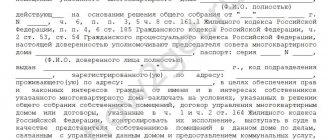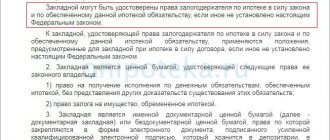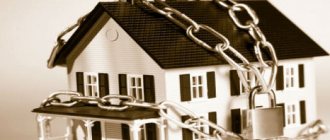The concept of “management of apartment buildings”
What is the definition of “MCD management”? This is a legal mechanism that is aimed primarily at achieving safe and reliable living conditions for ordinary citizens - owners of residential premises on the territory of an apartment building. The fundamental characteristic features of the definition are presented in more detail in the Housing Code of the Russian Federation, which explains all the standards for managing an apartment building and the procedure for selecting a management organization or HOA.
Among other things, it is in the presented Code that for the first time the legislator offers a detailed definition of the results of management of apartment buildings. Thus, management should be aimed not only at ensuring favorable conditions for living on the territory of residential premises, but also in a timely manner to provide homeowners with public utilities, and also be aimed at achieving consensus among owners on issues related to major repairs and maintenance of property.
Standards, goals and rules for managing apartment buildings
The basics of managing an apartment building, or more simply put, standards, imply setting a specific goal - for which such a legal mechanism is necessary. The goals and objectives of the management of apartment buildings are fixed by the rules of law in the housing sector of the Russian Federation and have an exhaustive list:
- guarantee of providing comfortable conditions in the territory of residential apartments in apartment buildings;
- appropriate maintenance of housing, including common property;
- mutually beneficial use by subjects of legal relations of common property on the territory of multi-apartment housing;
- providing a full range of utility services to homeowners.
To achieve these goals, the legislator has developed a whole list of tasks that will make it possible to achieve in practice significant results from the management of apartment buildings:
- homeowners must search for an organization that provides services and work;
- owners of residential premises must organize the procedure for the provision of housing and communal services by concluding an agreement for the management of an apartment building with a housing cooperative, partnership, management organization;
- a collective meeting of homeowners must control the volume of services provided, the quality of major repairs, even at the moment if the management agreement for an apartment building is signed with a partnership, a specific housing cooperative or management organization, etc.
Maintenance of common property in an apartment building
The terms of the management agreement for an apartment building imply the imposition on the HOA, housing cooperative, or management body of certain obligations, failure to fulfill which leads to the application of sanctions by law. In particular, these requirements, which are provided for by law, are spelled out in Decree of the Government of the Russian Federation No. 491.
The list of requirements for the management of common property and apartment buildings is considered open and can be supplemented by the Federal Law. It should be noted that the introduction of additional conditions for the management of common property falls only within the federal competence and in no way can be carried out by local self-government bodies.
It should be noted that the minimum list of services and works required for the management of common property (including for the provision of services for major housing repairs) has not yet been developed by government bodies.
This is determined by the fact that the management of apartment buildings in each specific case has its own specific individual parameters. In addition, the development of a universal list may limit the field of activity of an HOA, housing cooperative or management company.
Management of the management organization (MA)
This is the most common way to manage apartment buildings; all maintenance and repair work on most high-rise buildings in our country is carried out by management specialists.
The Housing Code of the Russian Federation requires that the management company perform absolutely all the work that is provided for in the minimum list and ordered by the owners under the contract. At the same time, the management company can hire other contractors, but it bears full responsibility for the quality of services.
To start working with a management organization, you must first conclude an agreement with it. To do this, it is necessary that at the general meeting the owners themselves choose which organization they are willing to entrust management to and approve the terms of the agreement. In reality, it often happens that the residents of the house never manage to get together and discuss this important problem.
If the owners do not independently choose a management organization, the latter is determined based on the results of a competition
To ensure that the house does not remain “ownerless,” local authorities take on the role of initiator of the general meeting. If the owners do not independently choose a management organization, then the latter is determined based on the results of a competition.
The management company must begin its duties within thirty days after the conclusion of the contract.
The essential terms of an agreement for the management of an apartment building are those points on which, without reaching agreement, the agreement is considered not concluded.
The Housing Code of the Russian Federation establishes that the following conditions must be agreed upon in the management agreement for an apartment building:
- the composition of the common property of the apartment building in respect of which management will be carried out, and the address of such a building;
- a list of services and works for the maintenance and repair of common property in an apartment building, the procedure for changing such a list, as well as a list of utilities provided by the management organization;
- the procedure for determining the price of the contract, the amount of payment for the maintenance and repair of residential premises and the amount of payment for utilities, as well as the procedure for making such payment;
- the procedure for monitoring the management organization’s fulfillment of its obligations under the management agreement.
In addition to the essential conditions provided for by law, these are any conditions on which the owners decided to reach an agreement with the management company. For example, in addition to the conditions on the procedure for monitoring the activities of the management company, the owners may insist on approval of a specific form of the annual financial report.
The terms of the contract may vary. The law provides a fairly wide range: from 1 year to 5 years. True, a 5-year agreement can only be concluded if the owners have elected a management company at a general meeting. If the management organization is chosen for the house based on the results of a competition held by local governments, the maximum term of the contract cannot exceed 3 years.
The management contract may be terminated before the agreed period. Reasons for termination:
- Agreement of the parties.
- A court decision in case of a significant violation of the contract by the management company or the owners of the premises.
- The general meeting of premises owners decided to terminate the contract with the management organization and select a new company (Housing Code of the Russian Federation / Article 162).
- One of the parties submitted a statement that it did not intend to continue working under the contract two months before the termination of the contract.
Advantages of the management company:
- The house is run by professionals;
- Management fees can be low even for small houses;
- Residents can influence the quality of services (complain about their management code to the Housing Inspectorate or change it ahead of schedule);
- Owners need to spend less time and effort on maintaining and repairing their home; it is enough to participate in general meetings at least once a year.
Disadvantages of the management company:
- It is more difficult for owners to track where exactly their money is being spent;
- The management company may go bankrupt or go bankrupt, and accordingly, all the accumulated money of residents will go “nowhere”;
- Owners find it difficult to negotiate contract terms that better protect their rights;
- Possible non-fulfillment of contractual relations.
Responsibilities of owners to manage apartment buildings. Selecting a management organization
Despite the fact that the legislative order provides for various forms of management of an apartment building, the main responsibility still rests with the owners of residential premises. This is regulated by Art. 39 of the Housing Code of the Russian Federation, which states that the owners of residential premises are obliged to carry out major repairs, as well as to properly care for common property.
This must be done in order to maintain the property in optimal condition, which will not pose a risk to persons who live on the premises.
If we make a reference to Art. 161 of the Housing Code of the Russian Federation, then property owners must necessarily select a method for managing apartment buildings. In another situation, this obligation passes to the municipal government, which, based on Art. 162, puts into practice the choice of method of managing an apartment building. In this case, the selection will take place between the HOA (partnership), the housing cooperative and the management company to carry out activities aimed at carrying out major repairs, managing common property and maintaining it in optimal condition.
Membership in TSN
Members and founders of TSN can be the owners of residential and non-residential premises in the house. Also, members of the partnership can be legal entities to which the above-mentioned public facilities belong to the right of ownership, economic management or operational management.
Membership in TSN arises from the owner on the basis of a written application to join the partnership (Parts 1 - 5, Article 143 of the Housing Code of the Russian Federation). If a partnership has already been created in the apartment building, then persons who bought apartments or rooms in this house can also become members of TSN on the basis of ownership of the premises.
The Ministry of Construction proposed to include all homeowners in TSN
123664
Membership in TSN is terminated after filing an application to leave the partnership or upon termination of ownership of the premises in the apartment building.
A register of partnership members must be kept in TSN . The register must contain information about all members of the TSN, the size of their shares in the right of common ownership of non-residential premises in the house. A member of TSN must provide reliable information about himself and promptly notify the board of the partnership of any changes.
Selecting and changing the MKD control method. Direct management by owners
In order for the management services of an apartment building to be put into practice in the interests of the owners, the collective meeting must hold a vote on the topic of how to carry out such activities. Today, the legislation provides for three main ways to carry out activities for managing common property (aimed at maintaining the building and carrying out major repairs):
- direct control of MKD;
- management of common property (for the purpose of carrying out major repairs) by concluding an agreement with a homeowners association, housing cooperative or other cooperative organizations;
- management of common property (including major repairs) through the services of management companies.
Direct management of apartment buildings, carried out personally by the owners of real estate, is a fairly common way of managing common property. This is due to the fact that property owners have every opportunity to manage apartment buildings without involving housing cooperatives or creating an HOA. It should be noted that there is no additional fee for the management of an apartment building by the owners of the premises, which allows reducing financial costs.
If necessary, residential apartment owners can transform the way they manage multi-apartment buildings. This can be determined both by failure to fulfill activities (obligations) to carry out major repairs, and by failure to provide utilities, despite the fact that payment for such work was made in a timely manner, that is, within the specified period.
How to choose a home control method
Residential owners can choose one of the management methods at a meeting that can be held:
- in person (apartment owners gather at a designated place and hold a vote in which everyone takes part);
- absentee (owners receive ballots and bring them already completed at the specified time).
The second method, as a rule, is used in cases where the majority of owners did not come to the meeting.
Limits of liability of management companies, HOAs and cooperatives
The legislative principle provides for certain liability of HOAs, housing cooperatives and management companies to the owners for improper performance of activities (including those aimed at carrying out major repairs). Responsibility for the activities of an HOA or housing cooperative is regulated by Part 2 of Art. 161 Housing Code of the Russian Federation.
In particular, housing cooperatives or partnerships undertake, within a specified period, to carry out work aimed at maintaining the property in proper condition and carrying out major repairs.
At the same time, they can carry out these types of services on their own and at the same time attract third-party employees under an employment contract (payment for the work is provided).
If an agreement is concluded with a management company, then partnerships or housing cooperatives exercise control over the activities of such organizations. In particular, supervision is also organized over whether management organizations disclose confidential information about how payment for services provided occurs, in what amount, etc.
TSN Charter
The TSN charter submitted for state registration must comply with the norms of the Civil and Housing Codes. According to clause 2 of Article 123.12 of the Civil Code of the Russian Federation, the charter of TSN must contain in its name the words “ partnership of real estate owners ”. The document must also contain the following information:
- location;
- the subject and goals of the partnership’s activities;
- composition and competence of TSN bodies;
- the procedure for making decisions, including issues on which decisions are made unanimously or by majority vote.
The TSN Charter is adopted at a general meeting of owners of premises in an apartment building by a majority vote of the total number of voters (Part 2 of Article 135 of the Housing Code of the Russian Federation). The decision of the OSS is considered adopted if the majority of meeting participants vote for it in the presence of a quorum (Clause 1 of Article 181.2 of the Civil Code of the Russian Federation). The decision of the meeting may be made by absentee voting.
GIS housing and communal services and absentee voting
260832
TSN is considered created after its state registration (Federal Law No. 129 of 08.08.2001 “On state registration of legal entities and individual entrepreneurs”). During the state registration of TSN, the minutes of the general meeting of owners of premises in the apartment building with the adopted decision on the issue of creating a partnership are presented (Part 5 of Article 136 of the Housing Code of the Russian Federation).
The provided OSS protocol must also contain the following information:
- on approval of the TSN charter;
- about the persons who voted at the general meeting of owners of premises in the apartment building for the creation of a partnership;
- on the shares owned by the voting persons in the right of common ownership of non-residential premises in the apartment building.
Also attached are the articles of association of the partnership . TSN must have a stamp with its name, a bank account, and other details.
The procedure for managing a newly built apartment building by the developer
Until a management agreement is concluded (the object of which is the apartment building), the legislator obliges to draw up an agreement with the direct developer of the building. It should be remembered that an agreement between the developer and other subjects of legal relations can be concluded no later than 5 days after the building is put into operation.
In addition, the Housing Code of the Russian Federation strictly regulates the term of the contract, which is concluded between the developer and the management organization (despite the fact that the object of such a contract is a newly built apartment building). Thus, a formal agreement cannot be concluded between the developer and the management company for a period of 1 to 3 years if an open competition was held. If such a competition has not been put into practice, then the agreement with the developer and the management company cannot exceed a period of 3 months.
Providers of public services and their quality
Any agreement that is concluded between the subjects of legal relations implies not only the object of the agreement, but also the main goals, as well as the result of its signing. In addition, the standard agreement specifies the person who will be considered the provider of utility services. These can be management companies, homeowners' associations, and housing cooperatives.
Regardless of who will manage the apartment building, authorized persons are entrusted with the obligation to supply utilities and carry out other work aimed at maintaining the common property.
If the provision of services is carried out improperly (even if payments are made on time by the owners), then sanctions are possible in the form of termination of the contract with the management company, homeowners' association and housing cooperative. The decision to apply sanctions is made at a general meeting of owners.
The housing sector is one of the most complex legal fields from a legal point of view. This is due to the fact that many owners of apartment buildings do not understand the very essence of real estate management, including how payments should be made for services provided, and where to go if the interests and rights of home owners are violated.










